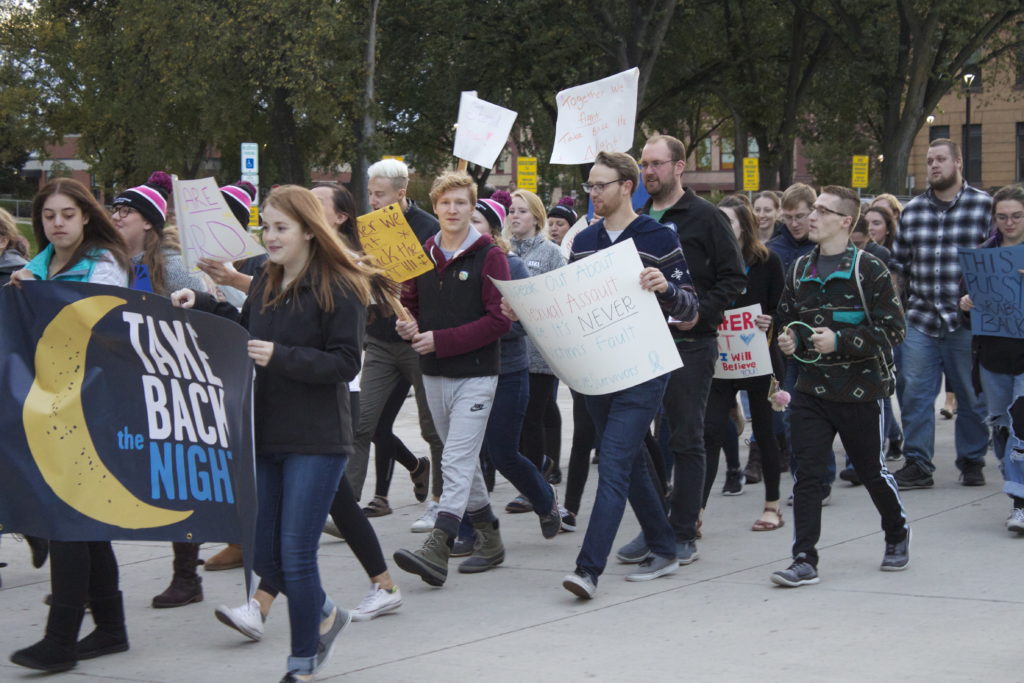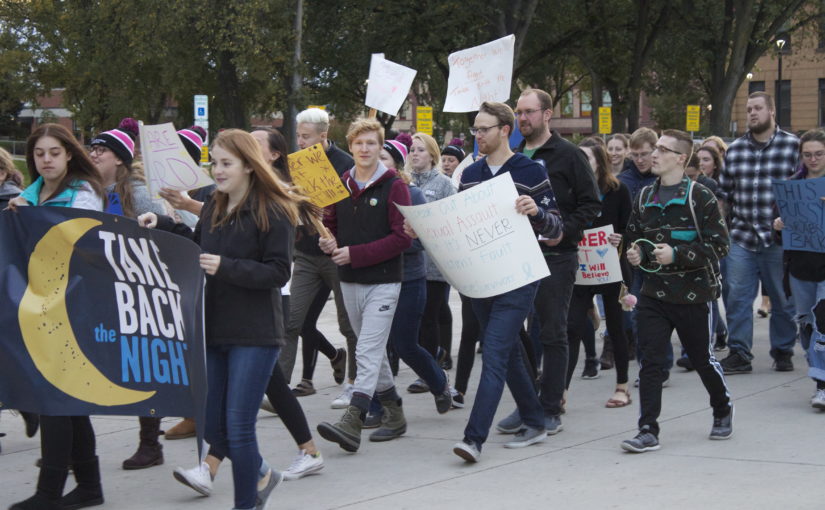
People supported victims of sexual assault and abuse by marching through the NDSU campus.
Over 40 years later, “Take Back the Night” is still making an impact on rape and abuse survivors around campus. Students and supporters held signs to end violence and the stigma around discussing the difficult topics.
The annual event organized by the Violence Prevention Educators took place Saturday, Sept. 29. During the march through the North Dakota State campus, signs like “Patriarchy is for dicks,” “If she was ‘asking for it’ why couldn’t you?” “Sexual violence should not be your college experience” and “I believe Christine Blasey Ford” made their way through the streets.
The group chanted, “Yes means yes. No means no,” “What do we want? Freedom. When do we want it? Now” and “Take a stand. Take back the night. Claim our bodies. Claim our rights,” to make sure people heard them and paid attention to what they were standing up for.
After the march, supporters gathered for a candlelight vigil and an open mic portion where survivors shared their trauma with others. During the vigil, members of the NDSU Violence Prevention Educators stood and spoke about the current hashtag, #whyIdidntreport, that has victims talking about why they didn’t report their trauma.
Members explained that one in three women will experience sexual assault or violence and that society has trained people not to report their trauma.
The importance of marching in support of those who have experienced sexual assault and/or abuse varies from person to person, but all believe that these events are needed to help survivors know they are not alone.
Megan Talcott, NDSU Sexual Assault Prevention and Advocacy coordinator, explained the importance of Take Back the Night. “I think it can feel very isolating as a victim, to feel like you’re alone, to feel like no one cares, to feel like no one will believe you, but when you look around a room and see a 100 people who are there for you and believe you — I think that is very freeing, very supporting to survivors,” Talcott said.
“We have all these resources on campus that are essentially free for us with the student fees, and some people aren’t taking advantage of them because they see it as that stigma, whether it’s mental illness or rape and abuse,” Ethan Johnson, member of Snap the Stigma, said. Snap the Stigma is a project that was created as a way for students to learn about and “snap the stigma” against mental health issues.
The Rape and Abuse Crisis Center assists survivors from current or past experiences and helps by navigating them through that trauma, whether it is legally or emotionally. “I think it’s important to kind of bring a voice to these issues because that really helps us when it comes to discussing the culture of this stuff,” Kristen Thomason, an advocate at the crisis center, explained.
The NDSU organization Healthy Herd Champions promotes physical, mental and spiritual health. “People kind of want to hide this topic where they don’t want to talk about it, and if we get people to talk about it, it’s going to be more normal, I guess, for people to go to the counselor – see someone for help,” Alison Peters, member of Healthy Herd Champions.
Booths staffed by organizations such as, Planned Parenthood, Rape and Abuse Crisis Center, American Association of University Women, NDSU Women’s Activist Organization, Healthy Herd Champions, Snap the Stigma and The Body Project were there to explain their services and support for those who have experienced trauma.
Some booths focused on mental and physical health but showed their support in those who shared their experiences. Tricia Tauer, a representative for The Body Project, said they find it important “to show support to all the men and women in the community.”
Speakers from the Violence Prevention Educators group started the event by thanking people for attending. Whether they were a survivor themselves or showed up in support of someone they know or knew, it created a sense of community and support.
An advocate from the Rape and Abuse Crisis Center explained that Take Back the Night is breaking the silence and honoring people who speak about their abuse. She also spoke of the importance of stopping the violence before it begins.
